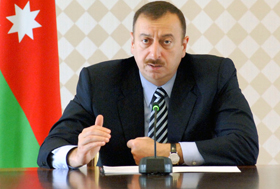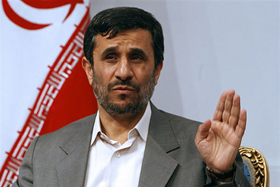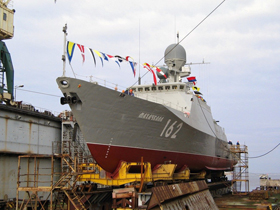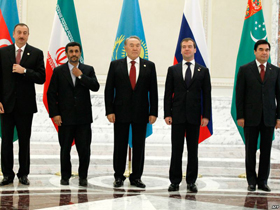In 2013, the Caspian Region should be eventful, with the Fourth Caspian Summit to take place by the end of the year, and presidential elections in Iran in June and in Azerbaijan in October. In the first half of the year, Barack Obama is going to unveil his second-term regional foreign policy priorities, which will to a great extent define the situation around Iran's nuclear program and the solution of Afghan problems.
In 2013, the Caspian Region should be eventful, with the Fourth Caspian Summit to take place by the end of the year, and presidential elections in Iran in June and in Azerbaijan in October. In the first half of the year, Barack Obama is going to unveil his second-term regional foreign policy priorities, which will to a great extent define the situation around Iran's nuclear program and the solution of Afghan problems.
One Region – Many Problems and Objectives
The Caspian Region is home to five states utterly diverse in ethnicity, religion and political structure. Each state features specific economic, social and political problems that are sure to surface in 2013.
For Azerbaijan, the event of the year is the presidential election. Amended by the 2009 referendum, the Constitution allows President Ilham Aliyev to run again. Mr. Aliyev is sure to win, as dynamic economic development, growing incomes and overall political and social stability render his opponents uncompetitive.
This year the republic should sign the landmark investment agreement for the huge Shah Deniz 2 gas field and finalize the gas delivery route to the EU. The issue of transportation through Turkey is already resolved, with the upcoming construction of the Trans-Anatolian Pipeline (TANAP). Nabucco is still on the list, as well as its competitors Nabucco West and Trans Adriatic Gas Pipeline (TAP). The Russian gas transportation system is out of the question because Gazprom would not open its infrastructure to other suppliers. Nagorno-Karabakh and the systemic modernization of the armed forces will remain hot topics in Baku.
During the past several years, Kazakhstan's key political issue has been the succession of power. It is its first president, Nursultan Nazarbayev, who has personally ensured the republic's progressive development and political stability over more than 20 years. Experts see two scenarios – either a gradual redistribution of presidential authority in favor of parliament or the selection of a successor who would suit the key national groups of influence. Both scenarios are flawed and fraught with fierce political confrontation in the future. The key threats are the remaining separatism and growing terrorist risks. Furthermore, Astana will also have to resolve conflicts with Russia regarding space matters.
2013 is going to be thorny for Iran, with the second presidency of Mahmud Ahmadinejad coming to end, while he cannot stand for re-election by law. The question of the winner and his attitudes, including those on Caspian matters, make for a major regional intrigue. The election outcome should be significant for shaping regional stability. Tensions over the Iranian nuclear program have several times come close to triggering an Israeli-American military operation. Plagued by stiff economic sanctions, Tehran must do its best and stabilize its economy against the backdrop of the rial drop and the budget deficit. It is noteworthy that the departing Iranian president has been keen on Caspian politics and quite successful in the field, making possible fundamental shifts towards the solution of many urgent Caspian problems. Specifically, the Caspian states have signed and ratified the Final Declaration of the Second Caspian Summit devoted to security issues, as well as the Framework Convention for the Protection of the Marine Environment of the Caspian Sea. This is why Iran's neighbors should closely watch the election campaign.
As is traditional, critical for Turkmenistan in 2013 is the expansion of gas exports. Ashkhabad will keep selecting new routes, among which are the Trans-Caspian Pipeline and the TAPI project (Turkmenistan-Afghanistan-Pakistan-India), and stepping up supplies along the existing lines. Early this year, President Gurbanguly Berdymukhammedov announced Turkmenistan's intention to join the WTO out of the blue. Experts doubt that the republic will be admitted quickly but either way the signal is a positive one, indicating that Turkmenistan is ready to gradually integrate into the world economy.
For Russia, the focus will be on hosting the next Caspian Summit. Moscow will also continue modernizing its Caspian Flotilla. Due to difficulties with access to northern sea oil deposits, Lukoil will expand offshore operations in the Russian sector of the Caspian Sea.
Although not a Caspian state, the United States should influence many regional processes through its steps and initiatives. Experts believe that the U.S.A. should not take any military action against Iran until American troops leave Afghanistan, because an operation might complicate the withdrawal. At the same time, Americans are expected to go ahead with economic pressure on Iran (so far effective), and to support the opposition protests, as they did in 2009, to influence the presidential elections through strengthening the liberal segment of the political elite.
The Results of the Third Caspian Summit
At talks in November 2010 in Baku, the Caspian states decided to hold the next Caspian Summit in Russia before 2013. While the location was not fixed, the choice was between Moscow and Astrakhan. A breakthrough in resolving this issue is hardly likely due to the geopolitical bottlenecks and to the presidential campaigns in two Caspian countries. But the Caspian Five has already proven its ability to find compromises on urgent issues even if serious disagreements exist.
At the Third Caspian Summit on November 18, 2010 in Baku, the presidents signed the Agreement on Security Cooperation in the Caspian Sea and the expanded joint declaration on the summit outcomes. The first document consolidates the provisions of the Declaration approved by the Caspian Five during the Second Caspian Summit in 2007 in Tehran, its most significant result being the fundamental decision to declare the Caspian "a sea of peace" and "solve all maritime issues by peaceful means." The Declaration also stated that the parties' armed forces are not targeted against other Caspian states. Each of the Caspian Five committed to refraining from providing its territory under any circumstances to any states for aggression or any other military operation against any of the parties.
The Baku Agreement also specifies the areas for Caspian cooperation, among them combating terrorism, poaching, organized crime and smuggling, as well as ensuring safe shipping. There is also a list of ministries and agencies responsible for fulfillment of the obligations in each country.
The joint statement on the summit results was no less significant. The presidents of the Caspian countries decided to grant intergovernmental status to the Commission on Marine Biological Resources of the Caspian Sea. They also agreed to hold the next summit in Russia before the end of the three-year period, and have the deputy-foreign-minister level group for elaboration of the Caspian Status Convention convened at least five times a year.
The most important and at the same time most contentious issue of sea delimitation was essentially bypassed, although algorithms for solution of some specific questions were outlined to bring work on the Caspian Status Convention nearer to completion. After the summit, Dmitry Medvedev, the then president of Russia, declared that in the coming three months we could expect an agreement on the 24-25-mile-wide Caspian national zone adjacent to the shoreline, which was confirmed by the other leaders. Due to the development of commercial shipping and fishing, the Caspian Sea should be divided into zones of responsibility, outlining the limits of each littoral state's jurisdictions, shipping lanes and national fishing zones. To this end, the parameters of the exclusive economic zone should be defined without awaiting solution of the Caspian status issue.
The summit's paramount achievement has been in making the parties seriously discuss urgent problems in security, ecology, etc., seek consensus solutions and prepare joint documents. Since the sectoral division question is not likely to be resolved in the next few years, the Caspian states should agree on burning economic and political issues. Otherwise, optimal use of the Caspian's transportation potential, and effective environmental protection, are highly improbable.
The next summit taking place in a Russian city should advance Moscow's regional initiatives, for example the establishment of the Caspian Economic Cooperation Organization (CECO), and CASFOR, the regional security system. Compilation of the agenda and hosting the summit offer Russia some opportunities. CECO could become an efficient regional organization, bearing in mind the multitude of potential areas for cooperation in the Caspian. Besides, there is no other international association to bring all Caspian states together. At the same time, signing the security agreement makes an important but not yet sufficient step to regional security. The countries should either set up a military organization with a joint control structure for crisis management, or develop coordinated practices for joint operations by the Caspian armies. Unfortunately, neither is in the works. Neighbor states are not really enthusiastic about the CASFOR initiative, fearing that Moscow will use it to strengthen its influence in the region. As such, as a country interested in Caspian stability and security, Russia's priority is to convince its regional partners that the projects are both indispensable and beneficial.








